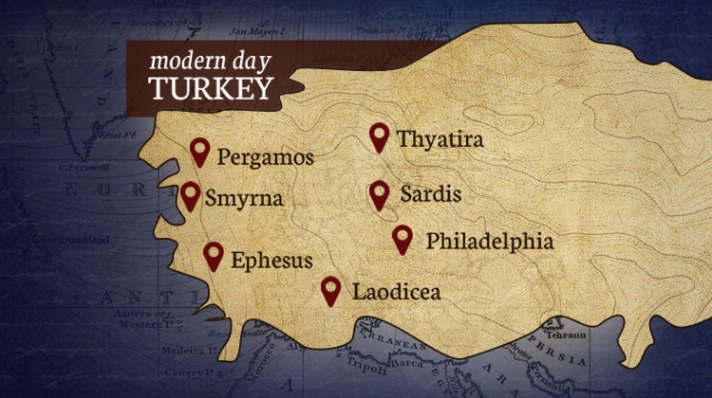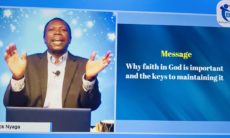The church in Ephesus is the first of seven churches in Asia Minor to receive a spiritual evaluation directly from God through Jesus Christ. It was pronounced world famous for its large temple to the pagan goddess Diana (in the New Testament, Diana’s name is a translation of the Greek word Artemis, Acts 19:27). It was a city on the western coast of Asia Minor, near the mouth of the Cayster River.
The city was also known for building the largest outdoor theater in the world, capable of containing 50,000 spectators. For many years Ephesus was the largest city in the Roman Empire next to Rome and boasted a population of more than a quarter million inhabitants.
The city’s location, therefore, favored its religious, political and commercial development, and presented a most advantageous field for the missionary labors of Paul. The city stood upon the sloping sides and at the base of two hills, Prion and Coressus, commanding a beautiful view; its climate was exceptionally fine, and the soil of the valley was unusually fertile” (International Standard Bible Encyclopedia, 1939, “Ephesus”).
Apostle Paul at Ephesus
The initial visit by Paul to Ephesus and the powerful preaching of Apollos marked the beginning of the Church of God in Ephesus (called simply the “church of Ephesus” in Revelation 2:1). The next time Paul came through the city, he found that some people, including “about twelve” men, had become disciples (Acts 19:1, 7).
Paul then spent three years in Ephesus (Acts 20:31)—a comparatively long time compared to the lengths of his stays in other areas—preaching the gospel. He began by first speaking in the synagogue and then later teaching daily in the school of Tyrannus “so that all who dwelt in Asia heard the word of the Lord Jesus, both Jews and Greeks” (Acts 19:10). Notable miracles took place with Apostle Paul at Ephesus, “Now God worked unusual miracles by the hands of Paul, so that even handkerchiefs or aprons were brought from his body to the sick, and the diseases left them and the evil spirits went out of them” (verses 11-12). These miracles and an attack by an evil spirit against someone other than Paul attempting to cast it out created quite a stir.
As the Bible explains, “This became known both to all Jews and Greeks dwelling in Ephesus; and fear fell on them all, and the name of the Lord Jesus was magnified. And many who had believed came confessing and telling their deeds. Also, many of those who had practiced magic brought their books together and burned them in the sight of all. And they counted up the value of them, and it totaled fifty thousand pieces of silver. So the word of the Lord grew mightily and prevailed” (verses 17-20).
The church of Ephesus thus became a sizable congregation and served as a major center for preaching the gospel to Asia (in what is now western Turkey). Paul wrote a letter to the Ephesians, which contains additional information about his ministry in this city. And when he came back through the area on his way to Jerusalem, he called for the elders to meet him.
The Bible reveals that Timothy later served as the pastor of the congregation in Ephesus (1 Timothy 1:1-Apostle John also spent many years in Ephesus toward the end of the first century and that this is where he died and was buried.
The message to the church of Ephesus
Revelation 2:1-7; “To the angel of the church in Ephesus write: The One who holds the seven stars in His right hand, the One who walks among the seven golden lampstands, says this: “I know your DEEDS and your TOIL and perseverance, and that you cannot tolerate evil men, and you put to the test those who call themselves apostles, and they are not, and you found them to be false;3 and you have perseverance and have endured for My name’s sake, and have not grown weary. 4BUT have this against you, that you have LEFT YOUR FIRST LOVE. 5 Therefore remember from where you have fallen, and REPENT and do the deeds you did at first; or else I am coming to you and will REMOVE your lampstand out of its place—unless you repent.6 Yet this you do have, that you hate the deeds of the Nicolaitans, which I also hate. 7 He who has an ear, let him hear what the Spirit says to the churches. To him who overcomes, I will grant to eat of the tree of life which is in the Paradise of God”.
The members of the church at Ephesus, hated the DEEDS of the Nicolaitans and would not allow them in their midst. However, the church of Ephesus was characterized by lovelessness and that is why it is referred to as the “loveless church” According to History, John and Timothy were the pastors of Ephesus. Domitian was the ruler who took vengeance against the Church of the Lord Jesus Christ and also took serious action against the pastors of the day. He exiled John to the Isle of Patmos, taking everything familiar to him away from him, but he could not prevent the Lord from coming to John. He could not prevent the revealing from taking place. It is this revelation that completed God’s Word. We are reminded as Christians to walk in love.
First love
The meaning of “first love” in this passage (Revelation 2:4) is the zeal and commitment to God these Christians had when they initially learned of God’s way of life. As the congregation began in Ephesus, it must have been exciting for these members to see the miracles that God performed through Paul and to witness the powerful impact the preaching of the gospel had upon their city and the region. As the scriptural record explains, “all the Jews and Greeks dwelling in Ephesus” heard of these miracles and many burned their books on magic and turned to God (Acts 19:17-20).
When one first learns of God’s way of life, it is quite natural to have an excitement and zeal for learning and living by God’s instructions. Over time, however, the new can wear off and one’s excitement for God can fade or dissipate. What apparently happened to these members at Ephesus was that over time, they began drifting away from God. Christ told them that they needed to “repent and do the first works” if they wanted to remain a part of the Church of God (Revelation 2:5).
Relevance for today
Concluding His message to the church of Ephesus, Jesus said, “He who has an ear, let him hear what the Spirit says to the churches. To him who overcomes I will give to eat from the tree of life, which is in the midst of the Paradise of God” (Revelation 2:7). In this statement Jesus advises us to heed the messages given to all of the churches so we can be in the Kingdom of God.
This advice to Ephesus remains relevant for us today. We need to maintain our love for God and for others. In John’s words, “In this the children of God and the children of the devil are manifest: Whoever does not practice righteousness is not of God, nor is he who does not love his brother” (1 John 3:10).
How does this message apply to you? Do you have a sincere “love of the truth” so you may be saved (2 Thessalonians 2:10)? Are you sustaining this love or is it waning? Do you truly love others as much as yourself?
To maintain your “first love” for God’s way of life, you need to fellowship with others of like mind if at all possible and you need to practice the spiritual disciplines of Christians: regular prayer, study, meditation and occasional fasting.
Visit us on Facebook – Please “Like and Follow”
Click the links below to see our latest posts..
Download Audio
Download PDF









